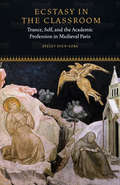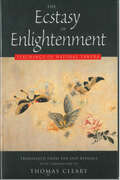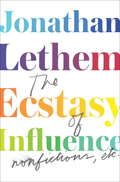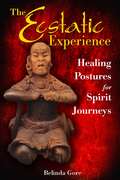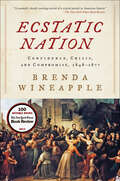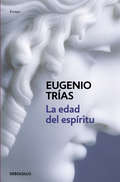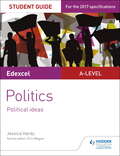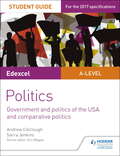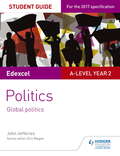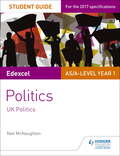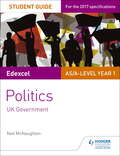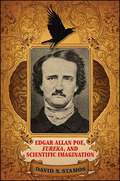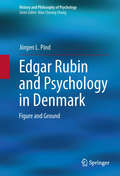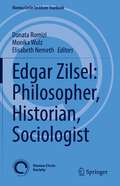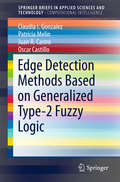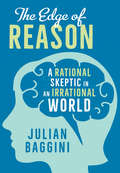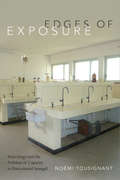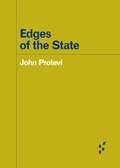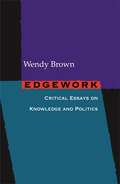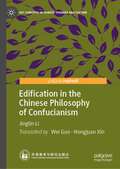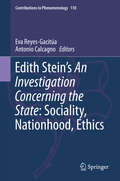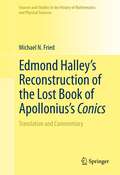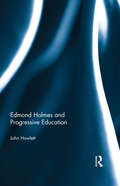- Table View
- List View
Ecstasy in the Classroom: Trance, Self, and the Academic Profession in Medieval Paris (Fordham Series in Medieval Studies)
by Ayelet Even-EzraCan ecstatic experiences be studied with the academic instruments of rational investigation? What kinds of religious illumination are experienced by academically minded people? And what is the specific nature of the knowledge of God that university theologians of the Middle Ages enjoyed compared with other modes of knowing God, such as rapture, prophecy, the beatific vision, or simple faith? Ecstasy in the Classroom explores the interface between academic theology and ecstatic experience in the first half of the thirteenth century, formative years in the history of the University of Paris, medieval Europe’s “fountain of knowledge.” It considers little-known texts by William of Auxerre, Philip the Chancellor, William of Auvergne, Alexander of Hales, and other theologians of this community, thus creating a group portrait of a scholarly discourse. It seeks to do three things. The first is to map and analyze the scholastic discourse about rapture and other modes of cognition in the first half of the thirteenth century. The second is to explicate the perception of the self that these modes imply: the possibility of transformation and the complex structure of the soul and its habits. The third is to read these discussions as a window on the predicaments of a newborn community of medieval professionals and thereby elucidate foundational tensions in the emergent academic culture and its social and cultural context. Juxtaposing scholastic questions with scenes of contemporary courtly romances and reading Aristotle’s Analytics alongside hagiographical anecdotes, Ecstasy in the Classroom challenges the often rigid historiographical boundaries between scholastic thought and its institutional and cultural context.
The Ecstasy of Enlightenment: Teachings of Natural Tantra
by Thomas ClearyThe Ecstasy of Enlightenment is an inside look at the spiritual world of Tantra--one of the most sophisticated, alluring, and controversial forms of Buddhism. Cleary unlocks the mysteries of the Carya-Giti, a collections of teachings by more than twenty famous Siddhas, or Tantric adepts, who lived during the illustrius Pala dynasty of old Bengal. These teachings emanate from one of the most dynamic sources of international Buddhism, at the height of its religious development, and as such, they are completely nonsectarian. Particularly noteworth is Cleary's demonstration of the parallels between Tantric Buddhism in Old Bengal and the original Zen Buddhism of China.
The Ecstasy of Influence
by Jonathan LethemWhat's a novelist supposed to do with contemporary culture? And what's contemporary culture supposed to do with novelists? InThe Ecstasy of Influence, Jonathan Lethem, tangling with what he calls the 'white elephant' role of the writer as public intellectual, arrives at an astonishing range of answers. A constellation of previously published pieces and new essays as provocative and idiosyncratic as any he's written, this volume sheds light on an array of topics from sex in cinema to drugs, graffiti, Bob Dylan, cyberculture, 9/11, book touring and Marlon Brando. Then there are investigations of a shelf's worth of his literary models and contemporaries: Norman Mailer, Philip K. Dick, Bret Easton Ellis, James Wood, and others. And, writing about Brooklyn, his father, and his sojourn through two decades of writing, one of the greats of contemporary American literature sheds an equally strong light on himself. Funny and unfettered,The Ecstasy of Influencesimmers with direct challenges to conventional wisdom and deep insights into the kaleidoscopic nature of artistic vision, the primacy of the writer in the cultural marketplace, and the way the author's own experiences have fuelled his creative passions.
The Ecstatic Experience: Healing Postures for Spirit Journeys
by Belinda GoreTrance-inducing postures for shamanic journeying, initiation, healing, divination, and transformation of the soul • Provides practices from Mayan, Egyptian, African, Native American, Sumerian, and other ancient and indigenous traditions • Shows how these practices can detoxify the energy body The human need for ecstasy--the ability to be free of the limitations of ordinary consciousness--is as imperative as the need for food. Renowned anthropologist Felicitas Goodman claimed that being deprived of ecstasy was the fundamental cause of all forms of addiction. Indigenous cultures and the civilizations of antiquity were aware of this and developed specific rituals to induce and channel trance energies to detoxify and nourish the subtle body in order to experience the ecstatic reality that gives life to matter. The body postures seen in ancient art from Mayan, Egyptian, African, Native American, Sumerian, and other ancient and indigenous traditions are a doorway to inducing this kind of ecstatic trance. People who assume these postures in a ritual context are able to experience expanded and transformative states of consciousness. Following up on the groundbreaking introduction of this practice in her first book, Ecstatic Body Postures, Belinda Gore provides a new series of 20 sacred postures and exercises that allow for a deeper understanding and utilization of these shamanic practices. She shows how to use the energy awakened by these practices for healing, shapeshifting, initiations into the mysteries of death and rebirth, divination, spirit journeying, and restoring balance to the cosmic patterns disrupted by destructive human activity.
Ecstatic Nation: Confidence, Crisis, and Compromise, 1848–1877
by Brenda Wineapple“From the death of John Quincy Adams through the Civil War to the tragedy of Reconstruction, Wineapple tells the American story brilliantly.” —Jon Meacham, Pulitzer Prize–winning authorA New York Times Notable Book of 2013A Kirkus Best Book of 2013A Bookpage Best Book of 2013Dazzling in scope, Ecstatic Nation illuminates one of the most dramatic and momentous chapters in America’s past, when the country dreamed big, craved new lands and new freedom, and was bitterly divided over its great moral wrong: slavery. With a canvas of extraordinary characters, such as P. T. Barnum, Walt Whitman, Frederick Douglass, and L. C. Q. Lamar, Ecstatic Nation brilliantly balances cultural and political history: It’s a riveting account of the sectional conflict that preceded the Civil War, and it astutely chronicles the complex aftermath of that war and Reconstruction, including the promise that women would share in a new definition of American citizenship. It takes us from photographic surveys of the Sierra Nevadas to the discovery of gold in the South Dakota hills, and it signals the painful, thrilling birth of modern America.An epic tale by award-winning author Brenda Wineapple, Ecstatic Nation lyrically and with true originality captures the optimism, the failures, and the tragic exuberance of a renewed Republic.“[A] fresh and riveting account of America at war with itself . . . Wineapple’s Ecstatic Nation does a laudable job of bringing to life not just the Civil War but the society in which it occurred—and has evolved into the present.” —Los Angeles Times“A masterly, deeply moving record of a crucial period in American history.” —The New York Times Book Review
La edad del espíritu
by Eugenio TríasUn viaje distinto a través de la historia del conocimiento. La experiencia de lo sagrado, lo sobrehumano, ha ido transformándose y modificando a su vez la forma en que el hombre concebía el universo y a sí mismo. Éste es el punto de partida desde el cual se nos propone un viaje distinto a través de la historia del conocimiento, una nueva odisea que presenta una visión global del pensamiento y del ser. Un diálogo entre la luz de la razón y la sombra de lo irracional, las dos vertientes que conforman el espíritu humano y lo convierten en lo que es: ni dios ni animal sino un ser fronterizo, hijo del mestizaje de ambas naturalezas. Reseña:«Un libro sumamente importante porque toma en consideración todas las religiones de Oriente y de Occidente.»José Luis Aranguren
La edad del espíritu
by Eugenio TríasÉste es el punto de partida que nos propone un viaje distinto a través de la historia del conocimiento, una nueva odisea que presenta una visión global del pensamiento y del ser. Un diálogo entre la luz de la razón y la sombra de lo irracional, las dos vertientes que conforman el espíritu humano y lo convierten en lo que es: ni dios ni animal sino un ser fronterizo, hijo del mestizaje de ambas naturalezas."Un libro sumamente importante porque toma en consideración todas las religiones de Oriente y Occidente"JOSÉ LUIS ARANGUREN
Edexcel A-level Politics Student Guide 3: Political Ideas
by Jessica HardyWritten by experienced teacher Jessica Hardy this Student Guide for Politics:-Identifies the key content you need to know with a concise summary of topics examined in the AS/A-level specifications-Enables you to measure your understanding with exam tips and knowledge check questions, with answers at the end of the guide-Helps you to improve your exam technique with sample answers to exam-style questions-Develops your independent learning skills with content you can use for further study and research
Edexcel A-level Politics Student Guide 4: Government and Politics of the USA
by Sarra Jenkins Andrew ColcloughExam board: EdexcelLevel: A-levelSubject: PoliticsFirst teaching: September 2017First exams: Summer 2018 (AS) Summer 2019 (A-Level)Written by experienced teachers Andrew Colclough and Sarra Jenkins this Student Guide for Politics:-Identifies the key content you need to know with a concise summary of topics examined in the A-level specifications-Enables you to measure your understanding with exam tips and knowledge check questions, with answers at the end of the guide-Helps you to improve your exam technique with sample answers to exam-style questions-Develops your independent learning skills with content you can use for further study and research
Edexcel A-level Politics Student Guide 5: Global Politics
by John JefferiesWritten by experienced teacher John Jefferies this Student Guide for Politics:-Identifies the key content you need to know with a concise summary of topics examined in the A-level specifications-Enables you to measure your understanding with exam tips and knowledge check questions, with answers at the end of the guide-Helps you to improve your exam technique with sample answers to exam-style questions-Develops your independent learning skills with content you can use for further study and research
Edexcel AS/A-level Politics Student Guide 1: UK Politics
by Neil McNaughtonExam Board: EdexcelLevel: AS/A-levelSubject: PoliticsFirst Teaching: September 2017First Exam: June 2018Reinforce your understanding throughout the course. Clear topic summaries with sample questions and answers will help you improve your exam technique to achieve higher grades.Written by experienced author Neil McNaughton this Student Guide for Politics:-Identifies the key content you need to know with a concise summary of topics examined in the AS/A-level specifications-Enables you to measure your understanding with exam tips and knowledge check questions, with answers at the end of the guide-Helps you to improve your exam technique with sample answers to exam-style questions-Develops your independent learning skills with content you can use for further study and research
Edexcel AS/A-level Politics Student Guide 1: UK Politics
by Neil McNaughtonExam Board: EdexcelLevel: AS/A-levelSubject: PoliticsFirst Teaching: September 2017First Exam: June 2018Reinforce your understanding throughout the course. Clear topic summaries with sample questions and answers will help you improve your exam technique to achieve higher grades.Written by experienced author Neil McNaughton this Student Guide for Politics:-Identifies the key content you need to know with a concise summary of topics examined in the AS/A-level specifications-Enables you to measure your understanding with exam tips and knowledge check questions, with answers at the end of the guide-Helps you to improve your exam technique with sample answers to exam-style questions-Develops your independent learning skills with content you can use for further study and research
Edexcel AS/A-level Politics Student Guide 2: UK Government
by Neil McNaughtonWritten by experienced author Neil McNaughton this Student Guide for Politics:-Identifies the key content you need to know with a concise summary of topics examined in the AS/A-level specifications-Enables you to measure your understanding with exam tips and knowledge check questions, with answers at the end of the guide-Helps you to improve your exam technique with sample answers to exam-style questions-Develops your independent learning skills with content you can use for further study and research
Edgar Allan Poe, Eureka, and Scientific Imagination
by David N. StamosSilver Winner, 2017 Foreword INDIES Book of the Year Awards in the Philosophy categoryIn 1848, almost a year and a half before Edgar Allan Poe died at the age of forty, his book Eureka was published. In it, he weaved together his scientific speculations about the universe with his own literary theory, theology, and philosophy of science. Although Poe himself considered it to be his magnum opus, Eureka has mostly been overlooked or underappreciated, sometimes even to the point of being thought an elaborate hoax. Remarkably, however, in Eureka Poe anticipated at least nine major theories and developments in twentieth-century science, including the Big Bang theory, multiverse theory, and the solution to Olbers' paradox. In this book—the first devoted specifically to Poe's science side—David N. Stamos, a philosopher of science, combines scientific background with analysis of Poe's life and work to highlight the creative and scientific achievements of this text. He examines Poe's literary theory, theology, and intellectual development, and then compares Poe's understanding of science with that of scientists and philosophers from his own time to the present. Next, Stamos pieces together and clarifies Poe's theory of scientific imagination, which he then attempts to update and defend by providing numerous case studies of eureka moments in modern science and by seeking insights from comparative biography and psychology, cognitive science, neuroscience, and evolution.
Edgar Rubin and Psychology in Denmark: Figure and Ground
by Jörgen L. PindEdgar Rubin was one of the outstanding pioneers of perceptual psychology in the early twentieth century. His approach involved a turning away from an earlier elementaristic psychology towards an approach based on "perceptual wholes." Rubin's approach is closely linked to the Gestalt revolution in perceptual psychology and was eagerly embraced by the Gestaltists. This has often led to Rubin being classified as a Gestalt psychologist. This misrepresents his position as is shown in the book. Rubin's aim was to develop a descriptive psychology -- or aspective psychology to use his terminology -- which would do full justice to the complex nature of psychological phenomena. Thus he rejected attempts by the Gestalt psychologists to explain diverse phenomena within a single overarching framework. While Rubin is internationally often misclassified as a Gestalt psychologist, in Denmark he is often hailed as a pioneer of a specific Danish "school of phenomenology." This also misrepresents Rubin's approach who was highly critical of psychological "schools." His criticisms of the overambitious theoretical aspirations of Gestalt psychology, his negative attitude towards school formation in psychology were both highly prescient. What remains today of Gestalt psychology is primarily its descriptive parts; the idea of schools of psychology, so common in early twentieth century psychology is now seen as a totally outmoded viewpoint. There is an interesting moral in this story for the history and status of psychology; to wit, that Rubin's emphasis on the correct description of psychological phenomena shows what is likely to live on as classic contributions to psychology. This certainly holds for his own work on figure and ground which, after almost a century, is still universally known and admired by psychologists. He was indeed a consummate psychological observer. The book argues for the importance of description in psychology.
Edgar Zilsel: Philosopher, Historian, Sociologist (Vienna Circle Institute Yearbook #27)
by Donata Romizi Monika Wulz Elisabeth NemethThis book provides a new all-round perspective on the life and work of Edgar Zilsel (1891-1944) as a philosopher, historian, and sociologist. He was close to the Vienna Circle and has been hitherto almost exclusively referred to in terms of the so-called “Zilsel thesis” on the origins of modern science. Much beyond this “thesis”, Zilsel’s brilliant work provides original insights on a broad number of topics, ranging from the philosophy of probability and statistics to the concept of “genius”, from the issues of scientific laws and theories to the sociological background of science and philosophy, and to the political analysis of the problems of his time. Praised by Herbert Feigl as an “outstanding brilliant mind”, Zilsel, being as a Social-Democrat of Jewish origins, mostly led a life of hardship marked by emigration and coming to a sudden and tragic end by suicide in 1944. The impossibility of an academic career has hindered the reception of Zilsel’s scientific work for a long time. This volume is a contribution to its late reception, providing new insights especially into his work during his years in Vienna; moreover, it shows the heuristic value of Zilsel’s ideas for future scholarly research – in philosophy, history, and sociology.
Edge Detection Methods Based on Generalized Type-2 Fuzzy Logic
by Claudia I. Gonzalez Patricia Melin Juan R. Castro Oscar CastilloIn this book four new methods are proposed. In the first method the generalized type-2 fuzzy logic is combined with the morphological gra-dient technique. The second method combines the general type-2 fuzzy systems (GT2 FSs) and the Sobel operator; in the third approach the me-thodology based on Sobel operator and GT2 FSs is improved to be applied on color images. In the fourth approach, we proposed a novel edge detec-tion method where, a digital image is converted a generalized type-2 fuzzy image. In this book it is also included a comparative study of type-1, inter-val type-2 and generalized type-2 fuzzy systems as tools to enhance edge detection in digital images when used in conjunction with the morphologi-cal gradient and the Sobel operator. The proposed generalized type-2 fuzzy edge detection methods were tested with benchmark images and synthetic images, in a grayscale and color format. Another contribution in this book is that the generalized type-2 fuzzy edge detector method is applied in the preprocessing phase of a face rec-ognition system; where the recognition system is based on a monolithic neural network. The aim of this part of the book is to show the advantage of using a generalized type-2 fuzzy edge detector in pattern recognition applications. The main goal of using generalized type-2 fuzzy logic in edge detec-tion applications is to provide them with the ability to handle uncertainty in processing real world images; otherwise, to demonstrate that a GT2 FS has a better performance than the edge detection methods based on type-1 and type-2 fuzzy logic systems.
The Edge of Reason: A Rational Skeptic in an Irrational World
by Julian BagginiAn urgent defense of reason, the essential method for resolving—or even discussing—divisive issues: &“A timely masterpiece.&”—Patricia S. Churchland, author of Touching a Nerve Reason, long held as the highest human achievement, is under siege. According to Aristotle, the capacity for reason sets us apart from other animals, yet today it has ceased to be a universally admired faculty. Rationality and reason have become political, disputed concepts, subject to easy dismissal. Julian Baggini argues eloquently that we must recover our reason and reassess its proper place, neither too highly exalted nor completely maligned. Rationality does not require a cold, sterile worldview—it simply involves the application of critical thinking wherever thinking is needed. Addressing such major areas of debate as religion, science, politics, psychology, and economics, the author calls for commitment to the notion of a &“community of reason,&” where disagreements are settled by debate and discussion, not brute force or political power. Baggini&’s insightful book celebrates the power of reason, our best hope—indeed our only hope—for dealing with the intractable quagmires of our time. &“The toxic gloating of &‘gut feelings,&’ hateful politics and heart-over-head attacks on good sense urgently need an antidote. Baggini has risen to the occasion…compelling.&”—Patricia S. Churchland, author of Conscience: The Origins of Moral Intuition
Edges of Exposure: Toxicology and the Problem of Capacity in Postcolonial Senegal (Experimental Futures)
by Noémi TousignantIn the industrialized nations of the global North, well-funded agencies like the CDC attend to citizens' health, monitoring and treating for toxic poisons like lead. How do the under-resourced nations of the global South meet such challenges? <P><P> In Edges of Exposure, Noémi Tousignant traces the work of toxicologists in Senegal as they have sought to warn of and remediate the presence of heavy metals and other poisons in their communities. Situating recent toxic scandals within histories of science and regulation in postcolonial Africa, Tousignant shows how decolonization and structural adjustment have impacted toxicity and toxicology research. <P>Ultimately, as Tousignant reveals, scientists' capacity to conduct research—as determined by material working conditions, levels of public investment, and their creative but not always successful efforts to make visible the harm of toxic poisons—affects their ability to keep equipment, labs, projects, and careers going.
Edges of the State (Forerunners: Ideas First)
by John ProteviUsing philosophical and scientific work to engage the perennial question of human nature This book takes a look at the formation, and edges, of states: their breakdowns and attempts to repair them, and their encounters with non-state peoples. It draws upon anthropology, political philosophy, neuroscience, evolutionary biology, child developmental psychology, and other fields to look at states as projects of constructing &“bodies politic,&” where the civic and the somatic intersect. John Protevi asserts that humans are predisposed to &“prosociality,&” or being emotionally invested in social partners and patterns. With readings from Jean-Jacques Rousseau and James C. Scott; a critique of the assumption of widespread pre-state warfare as a selection pressure for the evolution of human prosociality and altruism; and an examination of the different &“economies of violence&” of state and non-state societies, Edges of the State sketches a notion of prosocial human nature and its attendant normative maxims. Forerunners: Ideas First Short books of thought-in-process scholarship, where intense analysis, questioning, and speculation take the lead
Edgework: Critical Essays on Knowledge and Politics
by Wendy BrownEdgework brings together seven of Wendy Brown's most provocative recent essays in political and cultural theory. They range from explorations of politics post-9/11 to critical reflections on the academic norms governing feminist studies and political theory. Edgework is also concerned with the intellectual and political value of critique itself. It renders contemporary the ancient jurisprudential meaning of critique as krisis, in which a tear in the fabric of justice becomes the occasion of a public sifting or thoughtfulness, the development of criteria for judgment, and the inauguration of political renewal or restoration. Each essay probes a contemporary problem--the charge of being unpatriotic for dissenting from U.S. foreign policy, the erosion of liberal democracy by neoliberal political rationality, feminism's loss of a revolutionary horizon--and seeks to grasp the intellectual impasse the problem signals as well as the political incitement it may harbor.
Edification in the Chinese Philosophy of Confucianism (Key Concepts in Chinese Thought and Culture)
by Jinglin LiThis pivot focuses on “the concept of edification” in a bid to systematically expound its connotative structure and logical evolution. It is divided into ten chapters, embracing various issues, such as human nature as the foundation of edification, the development of edification and cultivation, the evolution of edification and the resultant life based on ritual and music, the political orientation and ultimate care of edification, and the nurturing of social edification, in an effort to offer a panoramic view of the intellectual features of Confucianism, and consequently a profound reflection on the cultural consciousness of contemporary China. The book is expected to satisfy the needs for a better understanding of edification as a Confucian concept, and the conceptual features of Chinese philosophy, or rather, Confucianism.
Edith Stein’s An Investigation Concerning the State: Sociality, Nationhood, Ethics (Contributions to Phenomenology #110)
by Antonio Calcagno Eva Reyes-GacitúaThis book explores Edith Stein's phenomenology of the state. It features chapters on the application of Stein’s political philosophy to real issues and questions affecting nations today. The contributors also situate Stein’s political theory within her larger philosophical corpus. The collection examines An Investigation Concerning the State from various angles. Scholars first consider some of the direct claims Stein makes about social and political ontology. They mine her work for its implications for and applications to contemporary debates. Then, the contributors position her work in relation to other figures in phenomenology, including Edmund Husserl and Max Scheler. Finally, Stein’s views are brought to bear on other disciplines, including feminism, theology, and literature. The contributors also use her theory of the state to address various contemporary issues, including bioethics and rights, globalization, as well as social and political inequality. The view of the state that emerges has implications for how we do politics and make ethical decisions. Moreover, Stein's work has an impact on our views of sociality (as opposed to the sociality of contractarian views of the state), pedagogy, women, theories of justice and law, as well as social psychology and religion. This volume helps readers better understand this vital voice in political philosophy and appeals to students, professors, and researchers working in the field.
Edmond Halley’s Reconstruction of the Lost Book of Apollonius’s Conics
by Michael N. FriedApollonius's Conics was one of the greatest works of advanced mathematics in antiquity. The work comprised eight books, of which four have come down to us in their original Greek and three in Arabic. By the time the Arabic translations were produced, the eighth book had already been lost. In 1710, Edmond Halley, then Savilian Professor of Geometry at Oxford, produced an edition of the Greek text of the Conics of Books I-IV, a translation into Latin from the Arabic versions of Books V-VII, and a reconstruction of Book VIII. The present work provides the first complete English translation of Halley's reconstruction of Book VIII with supplementary notes on the text. It also contains 1) an introduction discussing aspects of Apollonius's Conics 2) an investigation of Edmond Halley's understanding of the nature of his venture into ancient mathematics, and 3) an appendices giving a brief account of Apollonius's approach to conic sections and his mathematical techniques. This book will be of interest to students and researchers interested in the history of ancient Greek mathematics and mathematics in the early modern period.
Edmond Holmes and Progressive Education
by John HowlettAlthough considered a figure of great importance and influence by his contemporaries, Edmond Holmes has been consigned to relative obscurity in the progressive educational tradition. This book reinstates Holmes as a key figure in the history of progressive education, both as a school inspector and educational thinker, who was instrumental in forming a set of ideas and principles which continue to resonate in education today. Combining biographical detail and key critical analysis, Edmond Holmes and Progressive Education brings together the key ideas and aspects of Holmes’ life and establishes his writings as amongst the most insightful ever produced by an educationalist. Throughout his inspectorial career, Holmes scorned mechanical obedience in the classroom and was appalled by the inability of teachers to allow pupils to express themselves freely and imaginatively. His seminal publications positioned him at the vanguard of educational reforms. His work, however, was not exclusively educational, and throughout his life Holmes published on religion, philosophy, poetry and literature, subsuming his educational viewpoint into a much wider ‘philosophy of life’. His spiritual leanings and call for an improved education system, which would draw out the potential for development from within the child, inspired successive generations of progressive educators. In studying Edmond Holmes in detail, this book makes an important contribution to current debates surrounding creativity and the curriculum, in particular, the need for alternative educational voices within the state system of regulation. This book will be key reading for postgraduate students and researchers who are interested in progressive education, the history of education and educational policy and politics.
